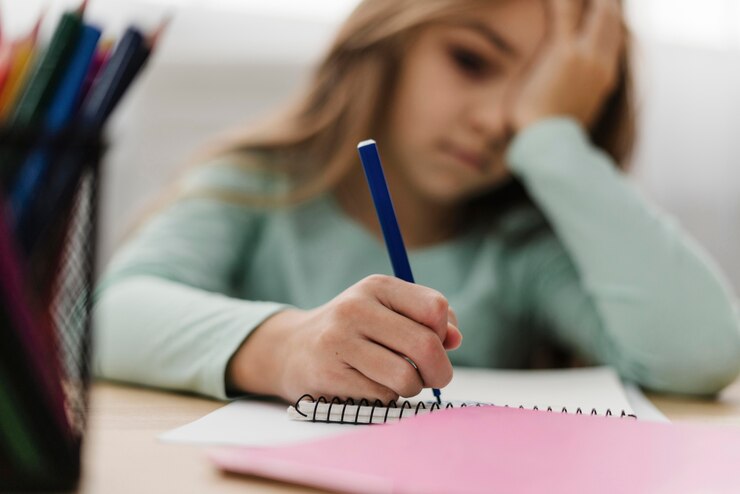Unlocking the Key to Overcoming Learning Difficulties in Children
Discover effective strategies and insights for conquering learning difficulties in children, unlocking their full potential.
 Is your child struggling with learning difficulties? As a parent, it can be challenging to watch your child face obstacles in their educational journey. But the good news is that there are strategies and resources available to help unlock the key to overcoming these challenges and set your child on the path to success. In this article, we will explore effective strategies and valuable resources that can make a significant difference in your child’s learning experience. From tailored learning techniques to specialized programs, we will delve into a range of approaches that have proven successful in helping children overcome learning difficulties. Whether it’s dyslexia, ADHD, or any other learning disorder, understanding the unique needs of your child is the first step towards finding the right solutions. Additionally, we will provide insights into valuable resources and tools that can further support your child’s learning journey. These may include educational apps, tutoring services, therapy options, or assistive technologies. Unlocking the key to overcoming learning difficulties is possible, and with the right strategies and resources, your child can thrive academically and develop the confidence to reach their full potential. Join us as we dive into the world of effective support for children with learning difficulties in children.
Is your child struggling with learning difficulties? As a parent, it can be challenging to watch your child face obstacles in their educational journey. But the good news is that there are strategies and resources available to help unlock the key to overcoming these challenges and set your child on the path to success. In this article, we will explore effective strategies and valuable resources that can make a significant difference in your child’s learning experience. From tailored learning techniques to specialized programs, we will delve into a range of approaches that have proven successful in helping children overcome learning difficulties. Whether it’s dyslexia, ADHD, or any other learning disorder, understanding the unique needs of your child is the first step towards finding the right solutions. Additionally, we will provide insights into valuable resources and tools that can further support your child’s learning journey. These may include educational apps, tutoring services, therapy options, or assistive technologies. Unlocking the key to overcoming learning difficulties is possible, and with the right strategies and resources, your child can thrive academically and develop the confidence to reach their full potential. Join us as we dive into the world of effective support for children with learning difficulties in children.
Understanding learning difficulties in children
learning difficulties in children can manifest in various ways and impact a child’s ability to acquire and apply knowledge effectively. These difficulties are often associated with neurological differences that affect how the brain processes information. It’s essential to recognize that learning difficulties in children are not indicative of a lack of intelligence but rather a difference in learning style. Some common types of learning difficulties include dyslexia, dyscalculia, dysgraphia, ADHD, and auditory processing disorder.
Common types of learning difficulties
- Dyslexia: Dyslexia is a specific learning disability that affects reading and language processing. Children with dyslexia may struggle with reading fluency, decoding words, and spelling.
- Dyscalculia: Dyscalculia involves difficulties with mathematical concepts and calculations. Children with dyscalculia may struggle with understanding numbers, performing arithmetic operations, and grasping mathematical concepts.
- Dysgraphia: Dysgraphia affects writing skills, including handwriting, spelling, and composition. Children with dysgraphia may have illegible handwriting, difficulty organizing their thoughts on paper, and trouble with grammar and punctuation.
- ADHD: Attention-deficit/hyperactivity disorder (ADHD) is a neurodevelopmental disorder characterized by inattention, hyperactivity, and impulsivity. Children with ADHD may have difficulty staying focused, following instructions, and completing tasks.
- Auditory Processing Disorder: Auditory processing disorder (APD) affects how the brain interprets and makes sense of sounds. Children with APD may struggle with understanding spoken language, following directions, and distinguishing between similar sounds.
Signs and symptoms of learning difficulties
 Recognizing the signs and symptoms of learning difficulties is crucial for early intervention and support. Some common indicators include:
Recognizing the signs and symptoms of learning difficulties is crucial for early intervention and support. Some common indicators include:
- Struggling with reading, writing, or math despite adequate intelligence
- Difficulty following instructions or staying focused in class
- Poor organizational skills and time management
- Avoidance of tasks that require reading or writing
- Low self-esteem and frustration with academic tasks
Understanding these signs can help parents and educators identify learning difficulties in children and provide appropriate interventions and support.
Strategies for overcoming learning difficulties
There are various strategies and approaches that can help children overcome learning difficulties and reach their full potential:
- Multi-sensory learning: Engaging multiple senses (such as sight, hearing, and touch) can enhance learning and memory retention. For example, using tactile materials, visual aids, and auditory cues can support children with learning difficulties.
- Structured and repetitive practice: Breaking down tasks into smaller, manageable steps and providing ample opportunities for practice can help reinforce learning and build confidence.
- Individualized instruction: Tailoring instruction to meet the specific needs and learning styles of each child can optimize learning outcomes. This may involve personalized learning plans, one-on-one instruction, or small group interventions.
- Positive reinforcement: Encouraging and praising children for their efforts and progress can boost motivation and self-esteem. Celebrating small achievements and setting realistic goals can foster a growth mindset and resilience.
- Utilizing technology: Leveraging assistive technologies such as text-to-speech software, speech recognition tools, and digital organizers can provide additional support for children with learning difficulties.
Implementing these strategies in collaboration with teachers, educational specialists, and other professionals can help children overcome learning difficulties and succeed academically.
Building a supportive learning environment
Creating a supportive learning environment is essential for children with learning difficulties to thrive. Some key elements of a supportive environment include:
- Positive relationships: Fostering strong relationships with teachers, peers, and family members can provide emotional support and encouragement.
- Clear expectations: Setting clear expectations and providing structured routines can help children feel secure and confident in their learning environment.
- Flexibility and accommodation: Being flexible and accommodating individual needs can empower children to learn at their own pace and style.
- Access to resources: Ensuring access to appropriate resources and materials, such as books, technology, and assistive devices, can facilitate learning and participation.
By creating a nurturing and inclusive learning environment, parents and educators can help children with learning difficulties thrive and reach their full potential (learning difficulties in children).
Resources for parents and educators
 Navigating the vast array of resources available for children with learning difficulties can be overwhelming. Here are some valuable resources for parents and educators:
Navigating the vast array of resources available for children with learning difficulties can be overwhelming. Here are some valuable resources for parents and educators:
- Learning disabilities associations: Organizations such as the Learning Disabilities Association of America (LDA) and the International Dyslexia Association (IDA) offer information, support, and advocacy for individuals with learning difficulties in children and their families.
- Educational apps and software: There are numerous educational apps and software programs designed to support learning and skill development for children with learning difficulties. Some examples include Read&Write, Khan Academy, and Learning Ally.
- Tutoring services: Private tutors or tutoring centers specializing in working with children with learning difficulties can provide individualized instruction and support (learning difficulties in children).
- Therapy options: Speech-language therapy, occupational therapy, and other therapeutic interventions can address specific challenges associated with learning difficulties in children, such as language processing, fine motor skills, and sensory integration.
- Assistive technologies: Assistive technologies such as text-to-speech software, graphic organizers, and adaptive devices can help children with learning difficulties access and engage with academic content more effectively.
By leveraging these resources, parents and educators can provide comprehensive support for children with learning difficulties and facilitate their academic success.
Individualized education plans (IEPs) and accommodations
Individualized education plans (IEPs) are legal documents that outline the specific educational goals, accommodations, and support services for students with learning difficulties. Some common accommodations and strategies included in IEPs may include:
- Extended time on tests and assignments
- Preferential seating in the classroom
- Modified assignments and assessments
- Assistive technology devices and software
- Additional support from special education teachers or aides
Collaborating with school personnel to develop and implement an effective IEP can ensure that children with learning difficulties receive the necessary support and accommodations to succeed in school (learning difficulties in children).
Assistive technology for learners with difficulties
Assistive technology plays a critical role in supporting learners with difficulties. Some examples of assistive technology tools and devices include:
- Text-to-speech software: Converts written text into spoken language, making it accessible to individuals with reading difficulties.
- Speech recognition software: Allows users to dictate text and control computer applications using voice commands, benefiting individuals with writing or motor skill difficulties.
- Graphic organizers: Visual tools that help students organize and structure their thoughts, aiding in comprehension and expression.
- Electronic organizers and reminders: Assist individuals with organization and time management difficulties by providing prompts and reminders for tasks and deadlines.
By integrating assistive technology into instruction and learning activities, educators can enhance accessibility and inclusion for learners with difficulties.
Professional help and support for learning difficulties
 Seeking professional help and support is essential for addressing the complex needs of children with learning difficulties. Some professionals who may be involved in the assessment and intervention process include:
Seeking professional help and support is essential for addressing the complex needs of children with learning difficulties. Some professionals who may be involved in the assessment and intervention process include:
- Educational psychologists: Conduct assessments to identify learning difficulties and develop intervention plans.
- Special education teachers: Provide specialized instruction and support for students with learning difficulties in the classroom.
- Speech-language pathologists: Assess and treat communication disorders that may impact learning, such as language processing difficulties.
- Occupational therapists: Address fine motor skills, sensory processing, and other functional challenges that affect learning and daily activities.
Collaborating with these professionals can help parents and educators develop comprehensive support plans tailored to the unique needs of each child (learning difficulties in children).
Conclusion
Unlocking the key to overcoming learning difficulties in children requires a multi-faceted approach that addresses the unique strengths and challenges of each child. By understanding the nature of learning difficulties, implementing effective strategies, and accessing valuable resources and support services, parents and educators can empower children to succeed academically and reach their full potential. With patience, persistence, and a commitment to collaboration, we can create a world where all children have the opportunity to thrive, regardless of their learning differences. Let’s work together to unlock the potential of every child and ensure that no one is left behind in their educational journey.
Unlocking the Key to Overcoming Learning Difficulties in Children
Learn more about Overcoming Learning Difficulties in Children on our YouTube channel.
#learningdifficultiesinchildren #childrenwithlearningdifficulties #childrenwithdyslexia



